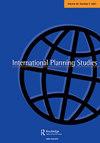Coping with collective interests in a self-organised planning regime: a critical analysis of the Oosterwold case (Almere, NL)
IF 1.5
Q4 REGIONAL & URBAN PLANNING
引用次数: 1
Abstract
ABSTRACT Self-organisation is a prominent concept in the field of urban studies, yet its application to planning practices is still minimal. In this regard, the Dutch Organic Development Strategies (ODS) stand out for being one of the few practical attempts to provide a legal framework for an incremental and open-ended urban development. Among the ODS, the Oosterwold case distinguishes itself for further exploring autonomy and decentralised decision-making. Few years following the project’s inception, a fieldwork analysis was intended to find a link between the self-organising processes that have taken place in Oosterwold, and their potential to cope with collective interests. The results have shown that stressing autonomy and incrementality undermined efficiency, feasibility, and compliance with the public interest. The case study analysis suggests that planners should not consider self-organisation as a goal per se and, when it comes to delivering collective infrastructures and services, self-governance, along with public support, might become necessary.在自我组织的计划制度中应对集体利益:对Oosterwold案件的批判性分析(荷兰阿尔梅尔)
摘要自组织是城市研究领域的一个突出概念,但它在规划实践中的应用仍然很少。在这方面,《荷兰有机发展战略》是为数不多的为渐进式和开放式城市发展提供法律框架的实际尝试之一。在ODS中,Oosterwold案以进一步探索自主性和分散决策而闻名。该项目启动几年后,一项实地调查分析旨在发现奥斯特沃尔德发生的自我组织过程与其应对集体利益的潜力之间的联系。研究结果表明,强调自主性和增量性损害了效率、可行性和符合公众利益。案例分析表明,规划者不应将自我组织本身视为一个目标,在提供集体基础设施和服务时,自我治理以及公众支持可能是必要的。
本文章由计算机程序翻译,如有差异,请以英文原文为准。
求助全文
约1分钟内获得全文
求助全文
来源期刊

International Planning Studies
REGIONAL & URBAN PLANNING-
CiteScore
4.60
自引率
4.80%
发文量
20
期刊介绍:
Planning, at urban, regional, national and international levels, faces new challenges, notably those related to the growth of globalisation as both an objective socio-economic process and a shift in policy-maker perceptions and modes of analysis. International Planning Studies (IPS) addresses these issues by publishing quality research in a variety of specific fields and from a range of theoretical and normative perspectives, which helps improve understanding of the actual and potential role of planning and planners in this context.
 求助内容:
求助内容: 应助结果提醒方式:
应助结果提醒方式:


